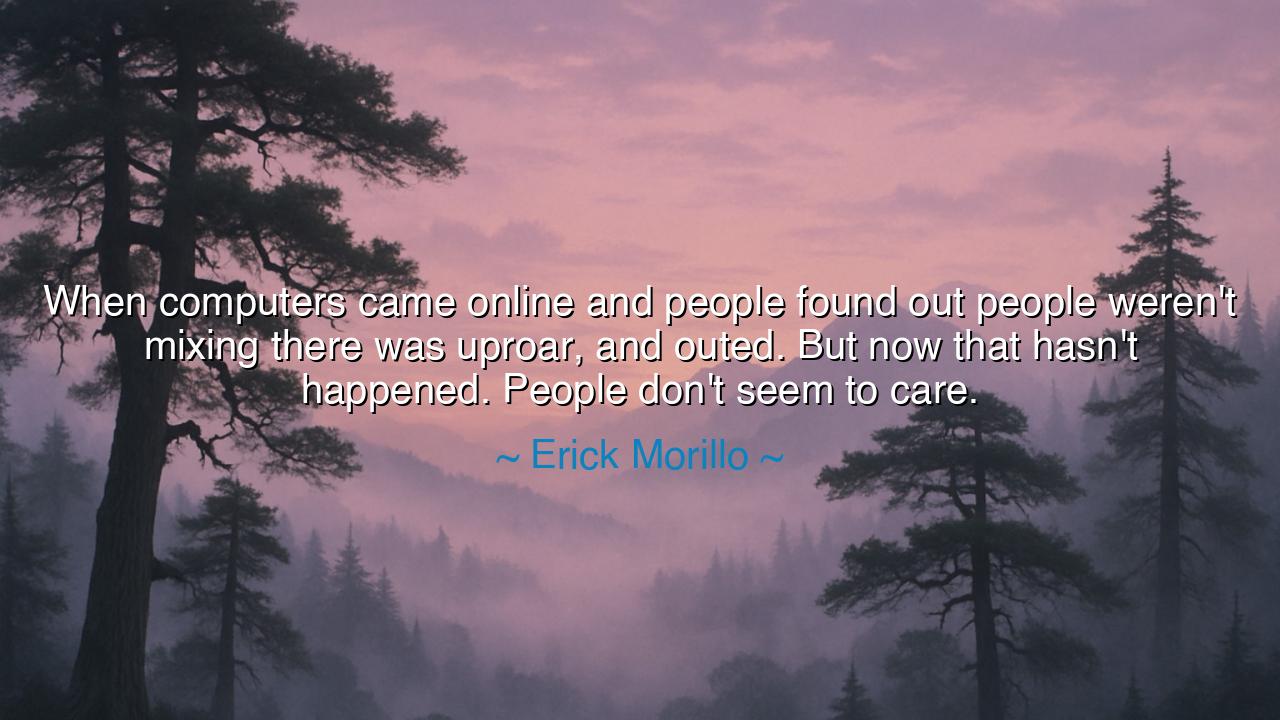
When computers came online and people found out people weren't
When computers came online and people found out people weren't mixing there was uproar, and outed. But now that hasn't happened. People don't seem to care.






“When computers came online and people found out people weren't mixing there was uproar, and outed. But now that hasn't happened. People don't seem to care.” – Erick Morillo
These words of Erick Morillo, the master of rhythm and sound, echo not only within the halls of music but across the soul of an age. Beneath their surface lies a lament for authenticity—for the fading fire of human craft in a world increasingly ruled by machines. Once, when the computer first entered the realm of music, artists and listeners alike cried out in dismay, fearing that the heart of the musician would be silenced by the cold logic of circuits. There was uproar, for people still believed that art should breathe, that the pulse of creation must be born of sweat, struggle, and soul. Yet, as Morillo observed, time has dulled that cry. What once shocked the world is now embraced without thought. The people, once vigilant, have fallen into quiet acceptance.
Morillo’s words emerge from the world of music mixing, where once the artist stood before turntables, feeling the rhythm beneath their fingertips, blending beats in real time with passion and precision. But when computers came, they made mixing effortless. The soul of performance—the trembling uncertainty, the thrill of mastery—was replaced by programs that could do the work in seconds. In his voice we hear not scorn for technology, but sorrow for the loss of reverence. For when a society ceases to care whether its art is alive or automated, it loses a part of its humanity.
In the ancient days, the sculptors of Greece spoke of the divine touch—the belief that a statue came alive only when the artist’s hands, guided by spirit, shaped the marble. When the Roman conquerors began to mass-produce the same statues for trade, the people rejoiced at the convenience, but the soul of the craft was lost. So it is in our own age. The computer, like the Roman mold, brings abundance but steals intimacy. What Morillo mourns is not the tool itself, but the indifference of mankind—the quiet surrender of wonder to convenience.
Consider the story of the Luddite weavers in England’s Industrial Revolution. When machines replaced the loom, they rose in rebellion, not from ignorance, but from a desperate plea to preserve the dignity of their hands. They feared a future where the artisan’s pride would be crushed by the engine’s perfection. And though their struggle was in vain, their cry was righteous. For even today, we see the same struggle reborn—in art, in labor, in the heart of every creator who wonders whether the world still values the human touch.
Morillo’s lament reveals something deeper: that we have grown numb to transformation. In the beginning, every revolution was met with awe and fear—fire, the wheel, the press, electricity. But now, in the age of endless upgrades and algorithms, we meet each new invention with a shrug. The uproar that once defined humanity’s moral vigilance has faded into silence. We no longer ask, “Should this be done?” but only, “Can it be done faster?” The danger, Morillo implies, is not that the machine creates—but that the human stops caring.
And yet, there is hope within his words, if one listens closely. For by naming this indifference, he awakens us to our duty: to care again. To demand authenticity not because the old ways were pure, but because creation is sacred when it is conscious. Technology need not be our master; it can be our instrument. The musician may use the computer, but must never let it silence the beat of his heart. The artist may code, but must remember to feel. The key is not to reject the machine, but to restore the soul within it.
Thus, the lesson stands, luminous and clear: do not let ease erase meaning. Whether in music, in work, or in life, let your hands and heart remain part of what you create. Question what you consume. Seek truth beyond the screen. Honor the imperfection that proves you are alive. For when a people no longer care how beauty is made, beauty itself begins to fade.
So let Erick Morillo’s words be both warning and wisdom: “When computers came online and people found out people weren't mixing there was uproar… But now people don’t seem to care.” Let us care again. Let us reclaim the sacred tension between man and machine. For though the computer may hum with precision, only the human heart can make it sing.






AAdministratorAdministrator
Welcome, honored guests. Please leave a comment, we will respond soon